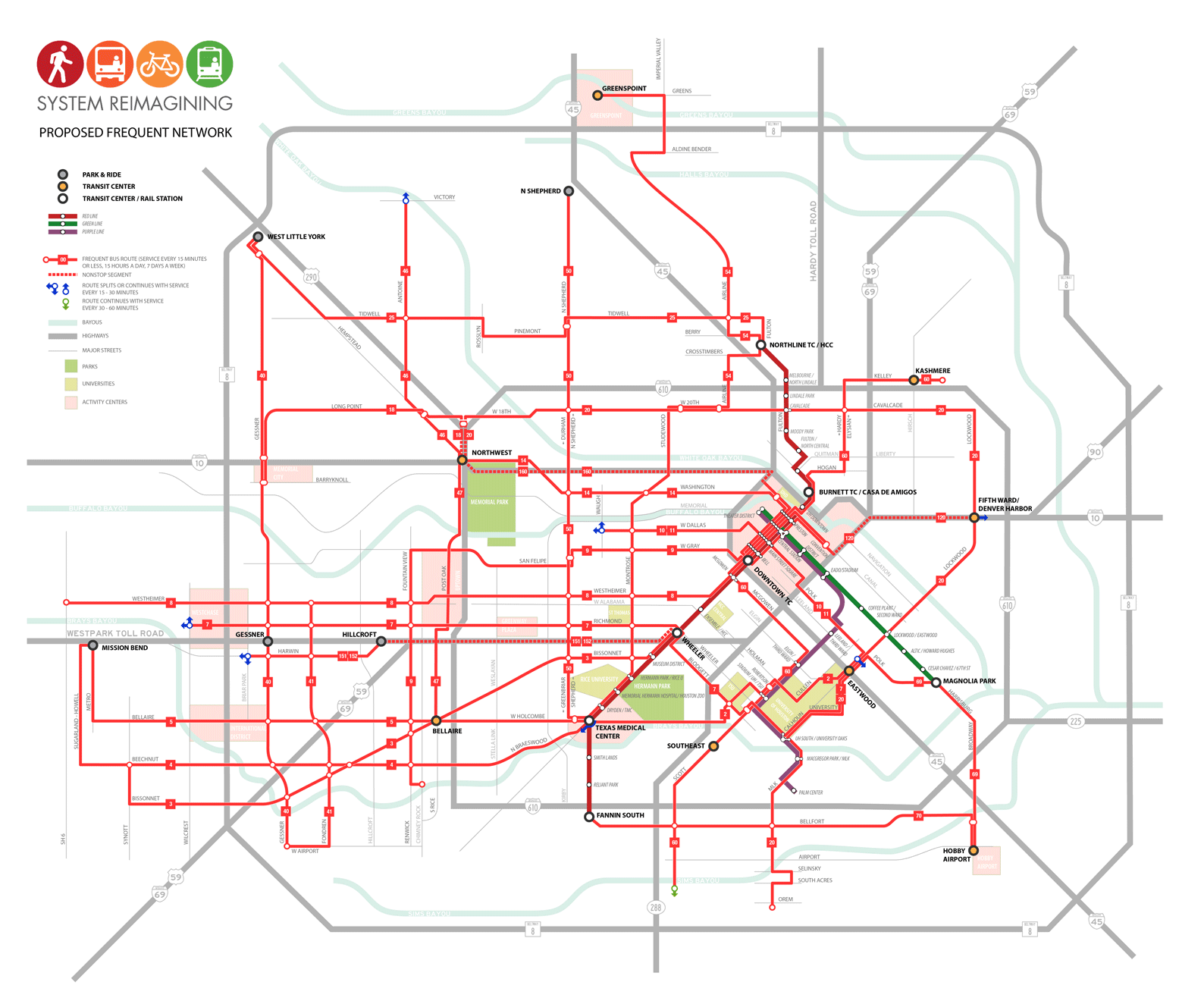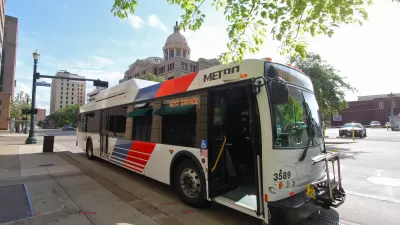Houston has proposed a large-scale overhaul of the Metro bus system. Based primarily on a high-frequency grid, the proposed plan would make sweeping changes to routes, nomenclature, and more. The plan will be a "must watch" for planners.
"Metro on Thursday released a draft of its 'reimagining' plan, intended as a broad upgrade to the region's bus system," reports Dug Begley. "Some officials said the plan could help increase ridership by 20 percent or more after two years."
"Metro buses, operating on a system largely developed in the 1980s, are essentially delivering the best service for the Houston of 1990," writes Begley in presenting the case for the upgrade. Specifically, "[the] system is based largely on an assumption that most people are trying to get downtown, although major employment centers have emerged elsewhere."
Begley's article quotes Jarrett Walker, who guided the redesign, in describing the obsolescence of the system: "Frankly, Houston is unique for how obsolete the system has gotten," says Walker.
Walker provides his own coverage of the proposal at his Human Transit blog, where he focuses especially on how much frequent network service will be gained by the overhaul—all without increasing operating costs. "The core idea of the new network is the high-frequency grid, designed to enable anywhere to anywhere travel with a single fast connection. Everywhere on the proposed network of red lines, that kind of easy access will be possible," explains Walker.
Eric Jaffe also examines the proposal, focusing on the frequent network but also some of the other improvements proposed by the plan: "The proposed system uses straighter routes and ties names to streets, which makes it more intuitive to navigate. It's an all-day system, which means riders get the same type of service on nights and weekends that they get during rush hours. Most importantly, the system connects to job centers all around the city instead of primarily the the downtown core, which creates better access between home and work."
A vote is likely in August or September. As Begley mentions in his coverage of the proposal, Metro officials are anticipating opposition, given the sweeping nature of the proposed changes.

FULL STORY: Metro unveils major change to bus service, awaits public outcry

Study: Maui’s Plan to Convert Vacation Rentals to Long-Term Housing Could Cause Nearly $1 Billion Economic Loss
The plan would reduce visitor accommodation by 25,% resulting in 1,900 jobs lost.

North Texas Transit Leaders Tout Benefits of TOD for Growing Region
At a summit focused on transit-oriented development, policymakers discussed how North Texas’ expanded light rail system can serve as a tool for economic growth.

Why Should We Subsidize Public Transportation?
Many public transit agencies face financial stress due to rising costs, declining fare revenue, and declining subsidies. Transit advocates must provide a strong business case for increasing public transit funding.

Alabama: Trump Terminates Settlements for Black Communities Harmed By Raw Sewage
Trump deemed the landmark civil rights agreement “illegal DEI and environmental justice policy.”

Dear Tesla Driver: “It’s not You, It’s Him.”
Amidst a booming bumper sticker industry, one writer offers solace to those asking, “Does this car make me look fascist?”

A Visual Celebration of Manhattan’s Chinatown Elder Community, Through Food
Lanterns, cafeteria trays, and community connection take center stage in this stunning photo essay.
Urban Design for Planners 1: Software Tools
This six-course series explores essential urban design concepts using open source software and equips planners with the tools they need to participate fully in the urban design process.
Planning for Universal Design
Learn the tools for implementing Universal Design in planning regulations.
City of Santa Clarita
Ascent Environmental
Institute for Housing and Urban Development Studies (IHS)
City of Grandview
Harvard GSD Executive Education
Toledo-Lucas County Plan Commissions
Salt Lake City
NYU Wagner Graduate School of Public Service



























